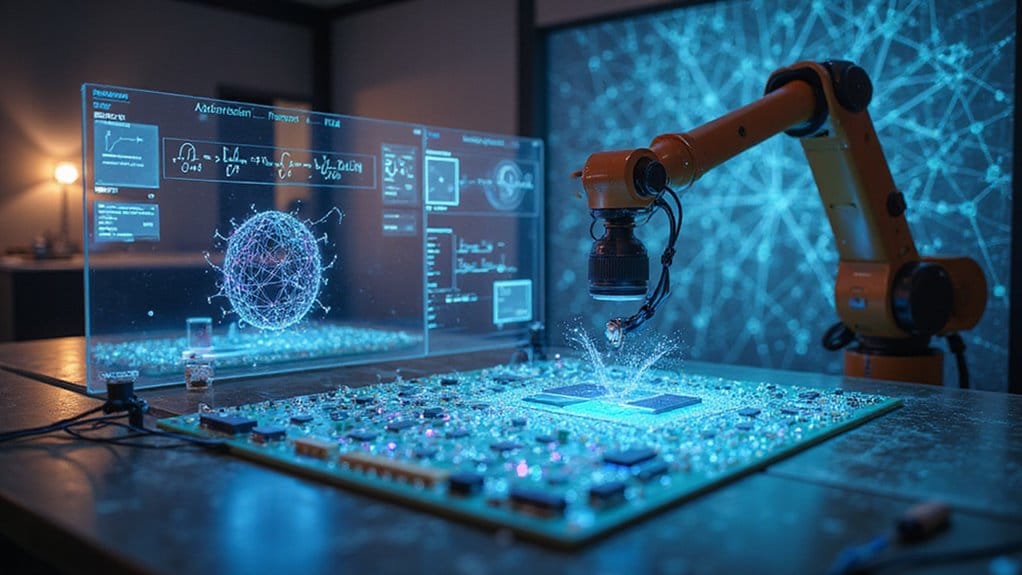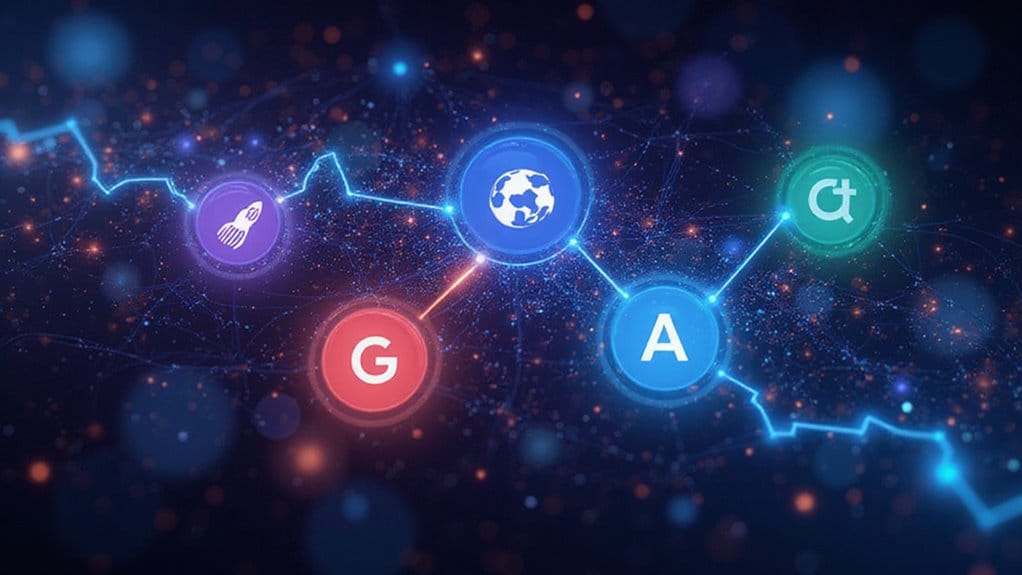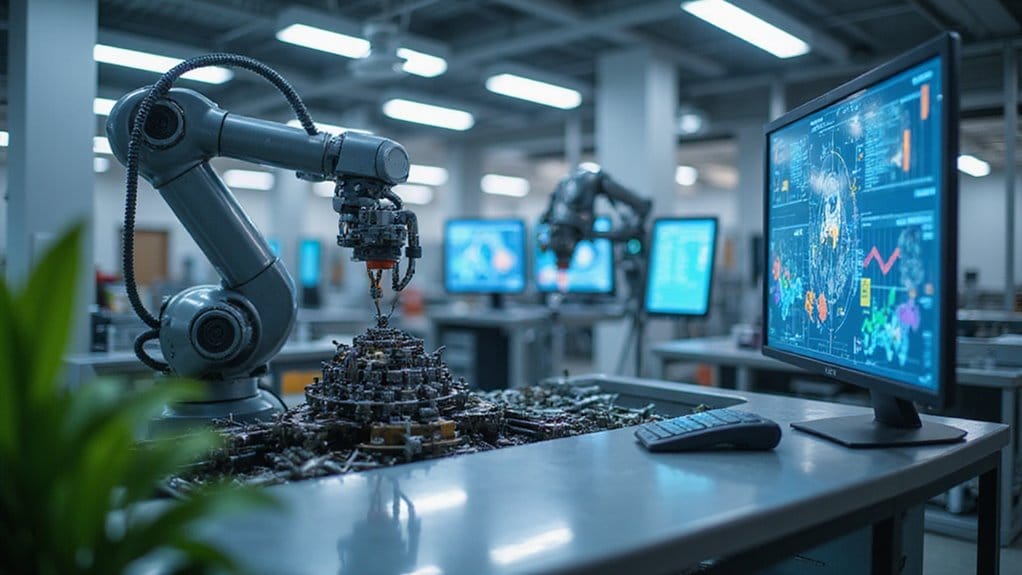The pioneers of AI, like Marvin Minsky and Allen Newell, created machines and programs that set the stage for today’s tech. They introduced groundbreaking concepts like learning machines and the Turing Machine, which still influence how AI operates. Today, innovators like Andrew Ng focus on making AI education accessible to everyone, pushing for fairness and responsible use. It’s not just tech; it’s about ethics and shaping the future. Curious about who else influenced this field? Keep on exploring!

Pioneers in artificial intelligence (AI) are the unsung heroes of our technological era, and their groundbreaking work shapes the very fabric of our future. Imagine a world where machines can think, learn, and adapt—thanks to these remarkable individuals, that world is not just a fantasy.
Marvin Minsky, for example, built one of the first learning machines, SNARC, which paved the way for artificial neural networks. This was a historical milestone! Then there were Allen Newell and Herbert A. Simon, who created the Logic Theorist, the first program that could prove mathematical theorems. Yes, folks, AI has roots deep in the intellectual soil of human ingenuity.
Marvin Minsky’s SNARC and Newell and Simon’s Logic Theorist mark pivotal moments in AI’s evolution, showcasing our deep intellectual heritage.
But let’s not forget the theoretical foundations laid by Alan Turing, who introduced concepts like the Turing Machine. These ideas are the bedrock upon which modern AI stands, and they remind us that even the brightest minds had to start somewhere. Turing’s work also established the principles of computational theory, which continue to underpin advancements in AI today.
It’s vital to recognize the ethical implications that these advancements bring. As AI grows, we must ask ourselves: How do we guarantee fairness and transparency? How do we guard against potential misuses? OpenAI’s commitment to ethical AI development ensures that these concerns are actively addressed. Moreover, the field of AI is transforming industries as it optimizes processes and creates innovative business models across various sectors.
Fast forward to the innovators like Andrew Barto and Richard Sutton, who revolutionized reinforcement learning. Their work explains how AI makes decisions—yes, machines can learn from their mistakes, just like us. So, think about the impact! Their research influences everything from computer science to neuroscience, shaping future generations of AI.
AI entrepreneurship is another exciting frontier. Innovators like Andrew Ng are democratizing AI education, making it accessible for everyone.
However, with great power comes great responsibility—data privacy and resource allocation are pressing challenges that demand our attention. As we harness the potential of AI across industries, let’s remember that the future of AI depends not just on technology but also on our commitment to ethical standards.
Frequently Asked Questions
What Industries Are Most Impacted by AI Innovations Today?
Today, industries like healthcare and finance are feeling the AI wave.
In healthcare automation, efficiency skyrockets as AI streamlines tasks—think faster patient records and fewer headaches.
Meanwhile, financial forecasting has never looked sharper; AI crunches numbers faster than you can say “invest wisely.”
Industries can’t afford to ignore these innovations! Adapt or risk being left behind.
How Can Individuals Contribute to AI Advancements?
Individuals can get in on the AI action by participating in crowdsourcing solutions or embracing open-source collaboration.
Join online platforms to share ideas and code—yes, you can help create the next big thing! Push boundaries, contribute to projects, and don’t forget to learn. Every bit helps!
Want to make a real difference? Advocate for ethical AI, educate others, and guarantee tech is used responsibly.
Don’t just watch—be the change!
What Ethical Concerns Surround AI Development?
AI development stirs up serious ethical concerns—think bias mitigation and data privacy.
Imagine this: AI often mirrors societal biases, leading to unfair outcomes. Yikes!
And don’t forget about your personal data; it’s out there, vulnerable to misuse.
So, what can you do? Demand transparency from AI creators, advocate for robust regulations, and stay informed.
Are There Any Notable AI Startups to Watch?
Watch out for exciting AI startups shaking things up! VEED offers slick video editing tools, while Fliki turns text into eye-catching videos.
Don’t overlook Codeium, which spruces up coding for developers, or Gamma, creating snazzy presentations.
With funding pouring in, these emerging technologies are not just trends; they’re game-changers.
How Can I Pursue a Career in AI Technology?
To pursue a career in AI technology, start with solid educational pathways—think computer science or math degrees.
Next, boost your skill development: learn programming languages like Python, and get comfy with machine learning frameworks.
Don’t just sit there! Get hands-on experience through internships or projects.
And hey, keep learning; AI evolves faster than your last smartphone update.
Certifications can sweeten the deal, so grab those, too.
Ready to plunge into it? The future’s calling!









